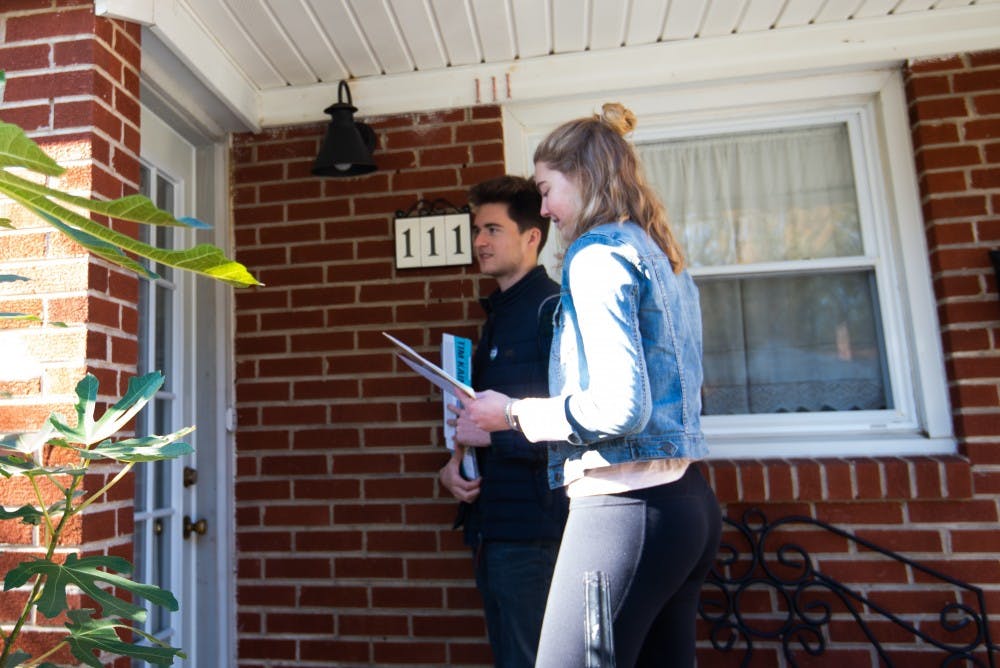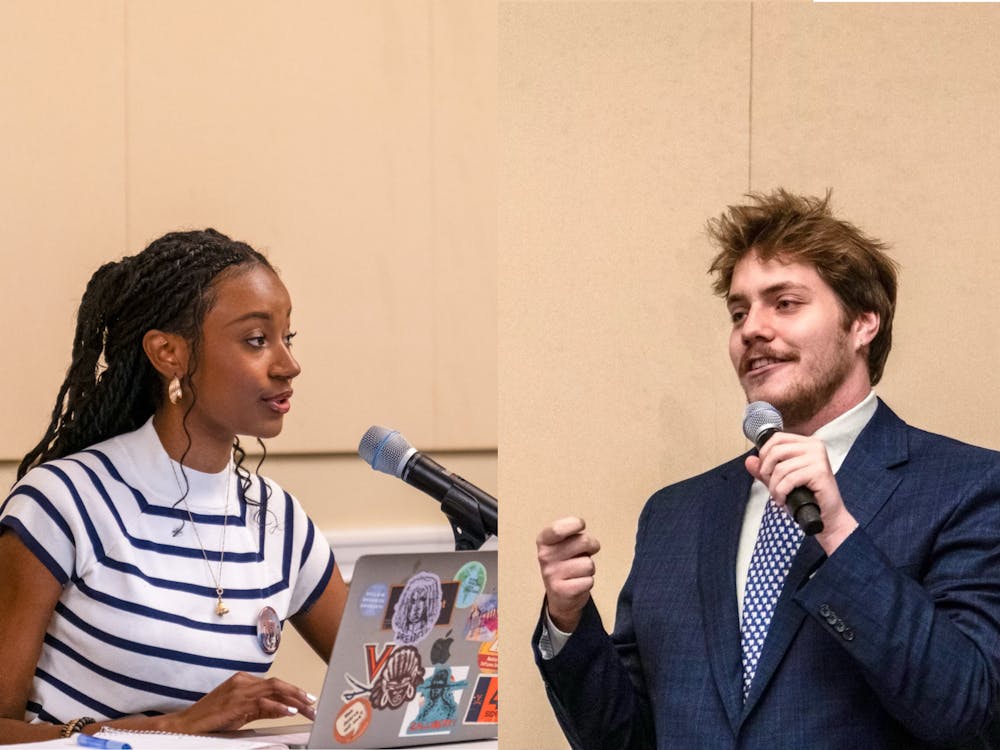The University Democrats sent out teams of volunteers into a variety of neighborhoods in Charlottesville Sunday as part of the organization’s ongoing canvassing effort prior to Tuesday’s elections. Volunteers visited residences to promote the Democratic candidates for the Fifth Congressional District and U.S. Senate — Leslie Cockburn and Tim Kaine respectively — and to ensure residents are prepared for Election Day.
Cockburn is competing against Republican Denver Riggleman for the Fifth District seat, and Kaine is running as the incumbent against Republican Corey Stewart for the Senate.
Saturday’s efforts marked the second wave of University Democrat canvassers to visit key neighborhoods in the City since Saturday, with a final third wave of volunteers to do a final sweep of residences by Tuesday.
The pre-Election Day canvassing comes after the College Republicans, the University Democrats and Student Council joined forces to host a voter registration drive earlier in the year which resulted in the registration of 2,500 students to vote.
“The Democratic party wants to makes sure every door is knocked at least three times, because statistically, you’re likely to get them at least once,” said Jackson Samples, University Democrats campaign chair and a third-year College student.
While the College Republicans are canvassing in the counties surrounding Charlottesville, the University Democrats are mainly staying in the City, where many of the Fifth District’s Democrats are.
“Essentially it stretches from Fauquier County which is right next to Dulles airport in Northern Virginia all the way to the North Carolina border, all the way down to Danville,” Samples said. “It’s this massive, size of New Jersey district that really doesn’t make a whole lot of sense in many aspects in the sense that it captures tons and tons of different communities, and it is the product of Republican gerrymandering.”
In the 2014 midterm elections, Charlottesville voted 77 percent for Democrat Mark Warner, and 14 percent for Republican Ed Gillespie. In the 2016 presidential elections, Charlottesville voted 79.7 percent for Democrat Hillary Clinton, and 13.2 percent for Republican Donald Trump.
Residents can end up on the lists for canvassing if they voted for a Democrat in a past primary election, or have ever donated to a Democratic campaign. The canvassing serves to make sure the data is up to date, logging if a resident has moved or is voting in another area.
“Usually we get our data from primary records,” Samples said. “Also if you’ve donated even one dollar, your data gets sent [to the party].”
Students are still a major target audience for the University Democrats through voter registration events and repetitive canvassing.
“For students, it’s been mostly focused, we had our huge voter registration push from the beginning of move-in weekend all the way to Oct. 15, .. making sure that students who tend not to be registered because of how frequently they move wasn’t a problem,” Samples said. “And also the fact that we canvass in student-heavy precincts every weekend is also a big part of our role in getting students to the polls and also local Charlottesville community members to the polls.”
If the resident isn’t there when the volunteers knock, they leave a door hanger with information about where to vote and what to bring. When they are able to reach a resident, they ask if the resident is voting for Cockburn and Kaine, if they know where their voting place is and if they have a plan for when to vote.
Residents were not always appreciative of the repeated visits, sometimes telling the volunteers to go away or simply not answering the door or refusing to answer questions. Some houses still had the flyers on their door knobs from the last time volunteers visited the house. Several residents were supportive of the canvassing efforts, saying that they were registered and planning to vote for Cockburn and Kaine on Election Day.
The volunteers don’t revisit houses that refused to answer questions, but Mary Alice Kukoski, University Democrats president and a third-year College student, said that it’s harder to refuse canvassers in person than over the phone.
“It’s really easy to tell if someone refuses over the phone because they hang up,” Kukoski said.
As the volunteers walked from house to house, some residents spotted them and preempted the whole conversation by telling the volunteers from far off that they had already registered.
One resident called out from his porch in the Buford Neighborhood, “I’m definitely not voting Republican!” as the canvassers approached so they didn't have to come up to his house.
Current analysis suggests the Fifth District race is a toss-up between Riggleman and Cockburn, despite Garrett having won the district with 58 percent of the vote against Democrat Jane Dittmar in 2016.
“I think it’s really important for students to get out and vote, especially because we do live here, the Fifth District, for about nine months out of the year, so voting here is really important,” Kukoski said. “Voting for Leslie Cockburn is really important because she’s a progressive candidate … is going to work to lower student debt and a whole other slew of student issues are … [at the] top of her platform.”
Prior to entering politics, Cockburn worked as an investigative journalist for 35 years. She worked as a “60 Minutes” CBS News producer, a “Frontline” PBS correspondent and is a published author. Cockburn is among six other female Democratic nominees in Virginia who had careers in fields other than politics.
Cockburn’s background as a journalist came up frequently in discussions about her approach to campaigning.
“Using her journalistic perspective, she has the skills to listen to everyone and listen to their needs and be able to represent those which is also important,” Kurkoski said.
When asked why this election season is especially important, Samples emphasized how the Virginia election could contribute to the balance of power changing hands in the national legislature.
“You do do have a serious chance to flip the House,” Samples said. “Meaning on a federal level, Democrats can have their voice heard in policymaking and the race here in the Fifth District is a huge integral part of flipping the entire House because it is such a toss up race.”






